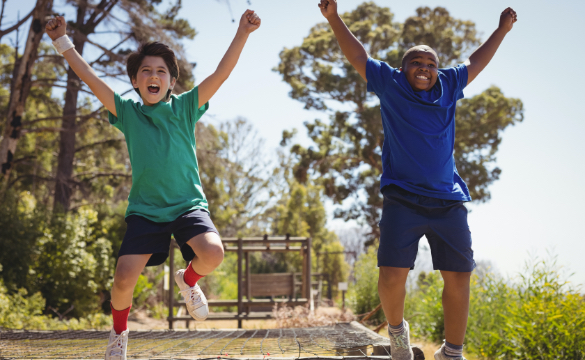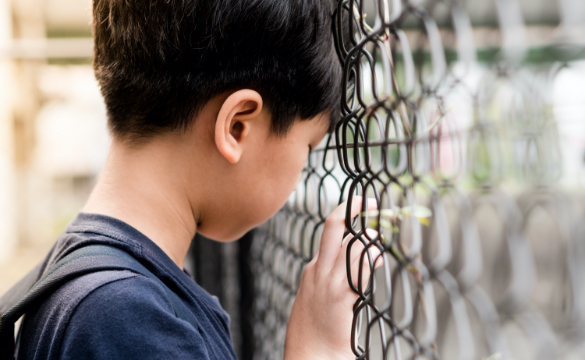Sometimes when we have been stressed for a long time we can start to feel anger.
Everyone feels anger in a different way.
We may feel anger in:
Sometimes when people are stressed they feel sadness.
When people are sad they tend to become quiet and don’t really feel like doing much.
Sadness feels different for everyone.
Sadness can make you feel tired. Or it may look like tears or a body that moves slowly.


Remember – stress is normal. You can feel stressed for no particular reason.
Try talking to someone you trust about how you feel. Talking about it might help you get some relief from your feelings.

Try telling them how you feel without blaming them.
‘This situation is making me feel really stressed, what do you think we can do to solve it.’
If this doesn’t work, try taking some time out. Do something you know makes you feel good.
Sometimes all you need is space.

Use the STOP Method.

Try doing something that gets you out and about in nature. A walk or ride around the block or perhaps Google a relaxing yoga class to try.

Have a relaxing bath or a warm shower with relaxing music playing. Slow or classical music can help relax your body and mind.

Sometimes racing thoughts can keep you awake at night.
Moving your focus away from these thoughts and back to your body can help you drift off to sleep.
Progressive Muscle Relaxation (PMR) can help take away tension in your body.
All you have to do is tighten and relax each part of your body, starting with your toes, then your feet, moving up your legs, then each part of your body all the way to your face.
Hold each body part for 5 seconds and then release.

Who can you speak to about your schoolwork?
Getting things off your chest can be very calming and help you to refocus. Your thoughts can have a big impact on your feelings towards your schoolwork.
See if you can follow this process from a recent unhelpful thought you’ve had.

Try taking 3 deep breaths.
Pretend you’re filling up a balloon in your belly, then let the air out.

Who is your school counsellor?
Talking to a trusted adult can be really helpful. Remember the basics of SELF (Sleep, Exercise, Leisure and Food) can really help to reduce anxiety.

Treating yourself like you would a friend can be very soothing. When you notice your negative self-talk, place a hand on your chest and say something nice to yourself, just like you would to a friend going through a tough time.
For example:
“I can see you aren’t feeling well, you have worked so hard today, I am really proud of you.”

Remember that all you can do is your best.
This breathing exercise might help:
Try sitting down somewhere quiet.
As you breathe in say to yourself ‘I do my best’….
As you breathe out say to yourself ‘ I let the rest go’.

Remember – stress is normal. You can feel stressed for no particular reason.
Try talking to someone you trust about how you feel. Talking about it might help you get some relief from your feelings.

Try telling them how you feel without blaming them.
‘This situation is making me feel really stressed, what do you think we can do to solve it.’
If this doesn’t work, try taking some time out. Do something you know makes you feel good.
Sometimes all you need is space.

Use the STOP Method.

Try doing something that gets you out and about in nature. A walk or ride around the block or perhaps Google a relaxing yoga class to try.

Have a relaxing bath or a warm shower with relaxing music playing. Slow or classical music can help relax your body and mind.

Sometimes racing thoughts can keep you awake at night.
Moving your focus away from these thoughts and back to your body can help you drift off to sleep.
Progressive Muscle Relaxation (PMR) can help take away tension in your body.
All you have to do is tighten and relax each part of your body, starting with your toes, then your feet, moving up your legs, then each part of your body all the way to your face.
Hold each body part for 5 seconds and then release.

Who can you speak to about your schoolwork?
Getting things off your chest can be very calming and help you to refocus. Your thoughts can have a big impact on your feelings towards your schoolwork.
See if you can follow this process from a recent unhelpful thought you’ve had.

Try taking 3 deep breaths.
Pretend you’re filling up a balloon in your belly, then let the air out.

Who is your school counsellor?
Talking to a trusted adult can be really helpful. Remember the basics of SELF (Sleep, Exercise, Leisure and Food) can really help to reduce anxiety.

Treating yourself like you would a friend can be very soothing. When you notice your negative self-talk, place a hand on your chest and say something nice to yourself, just like you would to a friend going through a tough time.
For example:
“I can see you aren’t feeling well, you have worked so hard today, I am really proud of you.”

Remember that all you can do is your best.
This breathing exercise might help:
Try sitting down somewhere quiet.
As you breathe in say to yourself ‘I do my best’….
As you breathe out say to yourself ‘ I let the rest go’.
 This work is licensed
under a
Creative Commons
Attribution-NonCommercial-NoDerivatives 4.0 International License.
This work is licensed
under a
Creative Commons
Attribution-NonCommercial-NoDerivatives 4.0 International License.